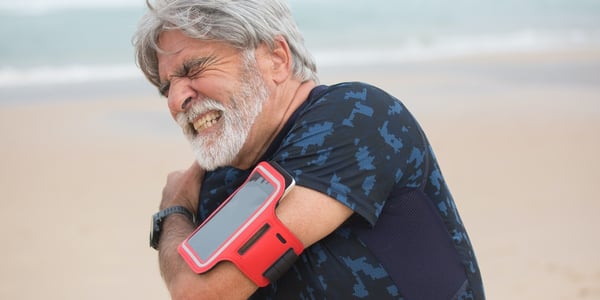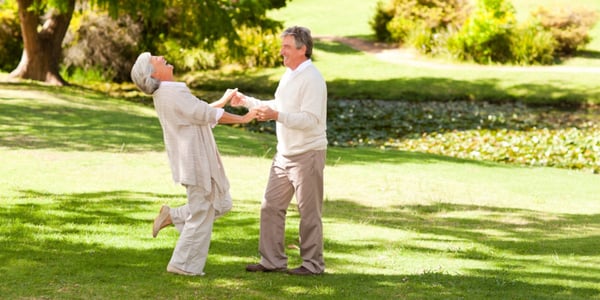As we age, maintaining flexibility and range of motion becomes increasingly important for our...
Should You Walk Barefoot Outdoors?
Did you know that walking barefoot can have a positive influence on your health? Walking barefoot might be something you only do at home. But for many, walking and exercising barefoot is a daily practice. As a child gets older, they shove their feet into shoes and lose the benefits that come from barefoot walking. That's why advocates of barefoot walking and exercising are pushing back on wearing shoes all day long and encourage everyone to let our feet be free.
Continue reading to learn more about why you might want to consider taking off your shoes and stepping outside!
Pros of Walking Barefoot
-
Fight Insomnia
If you have trouble sleeping, you may be suffering from sleeplessness or insomnia, a type of sleep disorder. It is believed that one of the benefits of walking barefoot on grass is that it promotes relaxation, thus reducing anxiety and improving your ability to fall asleep.
-
Improve Eyesight
There is a pressure point on your feet, which is believed to be connected to the nerves of your eyes. Walking barefoot can stimulate this pressure point and help improve your overall eyesight.
-
Improve Your Nervous System Health
Walking barefoot at home can stimulate specific acupuncture points in the food, and this will, in turn, stimulate your nerves and veins, thereby improving your nervous system. Diabetic people who experience pain from varicose veins may experience relief if they walk barefoot regularly.
-
Increase Energy
One of the benefits of walking barefoot on sand is that it gives you resistance, and this stimulates the pressure points on your feet. You may find it difficult to walk on the sand for a few days, but as your feet get used to it, you will develop more strength in your legs and body. Your energy levels will increase and keep you active during the day. You get the same benefits by walking barefoot on pebbles or stones.
-
Helps Menstrual and Hormonal Issues
When your hormones are not in balance, you will experience physical and mental issues. Women who have premenstrual syndrome often experience mood swings, headaches, stomach pain, a gain in weight, acne, constipation, and other issues. Walking barefoot on the ground can help ease many of these symptoms.
-
Reduces Inflammation
Inflammation is caused by damage to your body's cells, which may lead to complications like cancer, heart issues, and other problems. Walking barefoot helps the electrons in the ground act as antioxidants and reduce inflammation in your body.
-
Improve Cardiovascular Activity
As mentioned, walking barefoot helps improve the nervous system. This, in turn, helps improve blood circulation in your body. Greater blood circulation means a healthier cardiovascular system.
-
Maintain Blood Pressure
Your stress levels automatically come down when you walk barefoot as the nerves in your feet are stimulated, releasing stress. This is similar to when you get a foot reflexology massage. Since your stress comes down, your blood pressure also improves.
-
Clear Your Mind and Improve your Mood
If you have a lot of stress, walking barefoot on the grass can help you relax and focus on the present. Your body absorbs negative electrons through the earth, which helps create within it a balanced bioelectrical environment.
-
Improve Hygiene
You might notice your feet are a little moist after wearing shoes and socks for a long time. Right, they sweat. In the fresh air, this can evaporate and will keep the feet cool. In shoes and socks, it can create an unhealthy moist atmosphere where bacteria and fungi can grow.
-
Improve Your Walking
Walking barefoot helps you develop a softer gait, or manner of walking, which is better for your posture and your joints.
It's not just good for your feet. And it's wonderful training for your muscles. You train yourself to walk with a natural gait. Your feet will return at least partly to their natural form. Click here to learn more about how to walk better!
Cons of Walking Barefoot
Despite the many advantages of walking barefoot, before you make the decision to step out your front door, you should consider the following potential problems with barefoot walking.
-
Risk of Injury
You might get hurt, so you must take great care at every step. Watch your step, don't bump your toes, and lift your feet. If you walk barefoot every day, your skin will become tougher and more resistant to injury.
In nature, you have to watch out for stinging insects, thorns, and nettles. In the city, watch for broken glass, dog poop, and other trash.
-
Pests and Disease
In some areas, there might also be parasites such as hookworms or ticks. After hiking in nature, take a shower and carefully check your entire body for ticks. Pull them out if you find one (pharmacies sell tools for that if needed). Wearing shoes won't prevent ticks though, so this is not only related to walking barefoot.
As minor injuries cannot always be prevented, always have up-to-date vaccinations against tetanus and tick-borne encephalitis.
You might step on a thorn or other sharp object. Then, you'll just need to pull it out.
-
Extreme Temperatures
If you live in climates that exceed 100 degrees Fahrenheit, surfaces such as hot pavement may damage your soles. The same can be said about cold weather, which can expose your feet to frostbite.
Let us know in the comments below - do you like walking barefoot? Why or why not?






